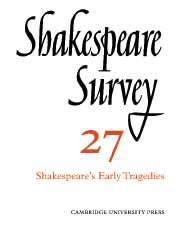Book contents
- Frontmatter
- Shakespeare’s Earliest Tragedies: ‘Titus Andronicus’ and ‘Romeo and Juliet’
- The Aesthetics of Mutilation in ‘Titus Andronicus’
- The Motif of Psychic Division in ‘Richard III’
- The Antic Disposition of Richard II
- The Prince of Denmark and Claudius’s Court
- ‘Hamlet’ and the ‘Moriae Encomium’
- The Relation of Henry V to Tamburlaine
- Shakespeare and the Puritan Dynamic
- Equity, ‘The Merchant of Venice’ and William Lambarde
- ‘Love’s Labour’s Won’ and the Occasion of ‘Much Ado’
- The Date and Production of ‘Timon’ Reconsidered
- Shakespeare, Her Majesty’s Players and Pembroke’s Men
- Judi dench talks to Gareth Lloyd Evans
- Shakespeare Straight and Crooked: A Review of the 1973 Season at Stratford
- The Year's Contributions to Shakespearian Study 1 Critical Studies
- 2 Shakespeare’s Life, Times, and Stage
- 3 Textual Studies
- Index
- Plate section
Shakespeare and the Puritan Dynamic
Published online by Cambridge University Press: 28 March 2007
- Frontmatter
- Shakespeare’s Earliest Tragedies: ‘Titus Andronicus’ and ‘Romeo and Juliet’
- The Aesthetics of Mutilation in ‘Titus Andronicus’
- The Motif of Psychic Division in ‘Richard III’
- The Antic Disposition of Richard II
- The Prince of Denmark and Claudius’s Court
- ‘Hamlet’ and the ‘Moriae Encomium’
- The Relation of Henry V to Tamburlaine
- Shakespeare and the Puritan Dynamic
- Equity, ‘The Merchant of Venice’ and William Lambarde
- ‘Love’s Labour’s Won’ and the Occasion of ‘Much Ado’
- The Date and Production of ‘Timon’ Reconsidered
- Shakespeare, Her Majesty’s Players and Pembroke’s Men
- Judi dench talks to Gareth Lloyd Evans
- Shakespeare Straight and Crooked: A Review of the 1973 Season at Stratford
- The Year's Contributions to Shakespearian Study 1 Critical Studies
- 2 Shakespeare’s Life, Times, and Stage
- 3 Textual Studies
- Index
- Plate section
Summary
Lord Angelo is precise; Stands at a guard with envy; scarce confesses That his blood flows; or that his appetite Is more to bread than stone. Hence shall we see If power change purpose, what our seemers be.
Measure for Measure, i, iii, 50-4Not to take the term in too narrowly confessional a sense we may identify three Puritans in Shakespeare: they are Shylock, Malvolio, and Angelo. The problem of usury in Shakespeare's time, dramatized in the relation of Shylock to Antonio, is one that had arisen specifically as a result of the new Calvinist social ethics. The capitalist individualism of Shylock and his distance from the aristocratic world of Belmont indicate that he represents to an important degree the new Puritan middle class and their problems. 'Lord Angelo', we are told, is 'precise', i.e., a precisian. As for Malvolio, he is indeed once actually named a Puritan by Maria (though she soon afterwards modifies the charge) but even without this we would have recognized him as a Puritan by his kill-joy attitude to the Twelfth Night celebrations of the merry folk. ' Thinkst thou because thou art virtuous there shall be no more cakes and ale'-could stand as a warning against what Puritanism threatened to do in the seventeenth century to the tradition of Merrie England.
- Type
- Chapter
- Information
- Shakespeare Survey , pp. 81 - 92Publisher: Cambridge University PressPrint publication year: 1974
- 3
- Cited by

